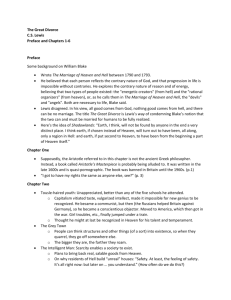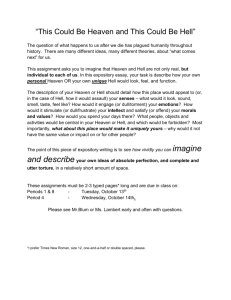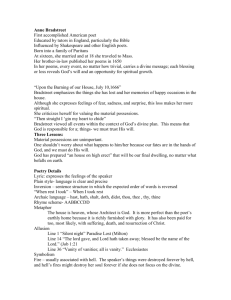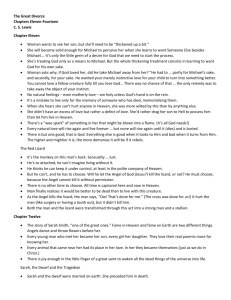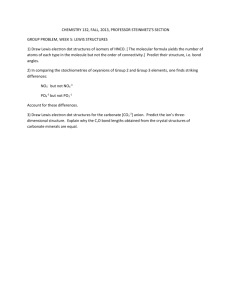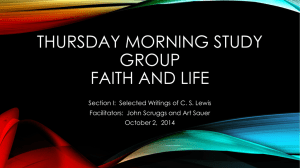The Great Divorce and the Eschatology of Lewis
advertisement
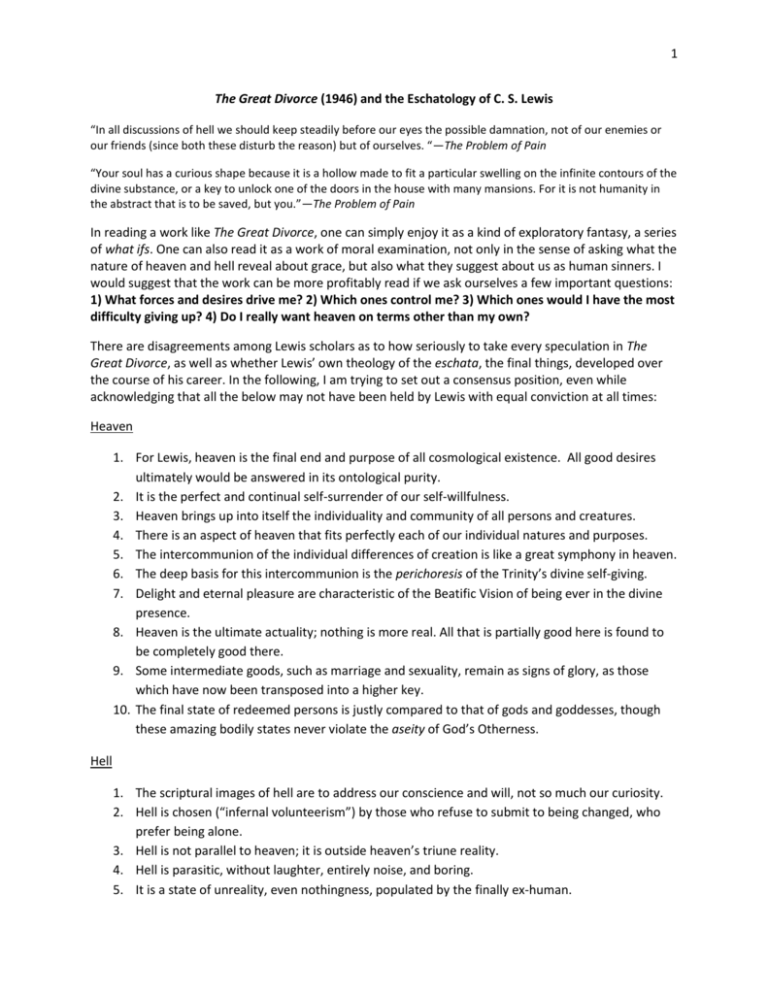
1 The Great Divorce (1946) and the Eschatology of C. S. Lewis “In all discussions of hell we should keep steadily before our eyes the possible damnation, not of our enemies or our friends (since both these disturb the reason) but of ourselves. “—The Problem of Pain “Your soul has a curious shape because it is a hollow made to fit a particular swelling on the infinite contours of the divine substance, or a key to unlock one of the doors in the house with many mansions. For it is not humanity in the abstract that is to be saved, but you.”—The Problem of Pain In reading a work like The Great Divorce, one can simply enjoy it as a kind of exploratory fantasy, a series of what ifs. One can also read it as a work of moral examination, not only in the sense of asking what the nature of heaven and hell reveal about grace, but also what they suggest about us as human sinners. I would suggest that the work can be more profitably read if we ask ourselves a few important questions: 1) What forces and desires drive me? 2) Which ones control me? 3) Which ones would I have the most difficulty giving up? 4) Do I really want heaven on terms other than my own? There are disagreements among Lewis scholars as to how seriously to take every speculation in The Great Divorce, as well as whether Lewis’ own theology of the eschata, the final things, developed over the course of his career. In the following, I am trying to set out a consensus position, even while acknowledging that all the below may not have been held by Lewis with equal conviction at all times: Heaven 1. For Lewis, heaven is the final end and purpose of all cosmological existence. All good desires ultimately would be answered in its ontological purity. 2. It is the perfect and continual self-surrender of our self-willfulness. 3. Heaven brings up into itself the individuality and community of all persons and creatures. 4. There is an aspect of heaven that fits perfectly each of our individual natures and purposes. 5. The intercommunion of the individual differences of creation is like a great symphony in heaven. 6. The deep basis for this intercommunion is the perichoresis of the Trinity’s divine self-giving. 7. Delight and eternal pleasure are characteristic of the Beatific Vision of being ever in the divine presence. 8. Heaven is the ultimate actuality; nothing is more real. All that is partially good here is found to be completely good there. 9. Some intermediate goods, such as marriage and sexuality, remain as signs of glory, as those which have now been transposed into a higher key. 10. The final state of redeemed persons is justly compared to that of gods and goddesses, though these amazing bodily states never violate the aseity of God’s Otherness. Hell 1. The scriptural images of hell are to address our conscience and will, not so much our curiosity. 2. Hell is chosen (“infernal volunteerism”) by those who refuse to submit to being changed, who prefer being alone. 3. Hell is not parallel to heaven; it is outside heaven’s triune reality. 4. Hell is parasitic, without laughter, entirely noise, and boring. 5. It is a state of unreality, even nothingness, populated by the finally ex-human. 2 6. A complete imprisonment within the self, it may also be the complete loss of any true self, the self being digested by the demonic. 7. Hell is not sequentially endured; it is a state of final, hardened moral non-entities. 8. The intensity and retribution of perdition speak to the unchanging “infernal finality” of what remains in hell. The Final Judgment Since we discussed Lewis’ mature beliefs about purgatory with A Grief Observed, I only want to add here that The Great Divorce may or may not represent an intermediate set of beliefs in which purgatory is a movable attachment to hell or heaven. What is perhaps more important is how Lewis seeks to speak to the nature of divine judgment and free will. 1. Lewis does hold to a final consummation of all things; there is a point in which every entity that can choose will be past choice. 2. The fire of God’s judgment is his own divine Love and will either purify us by unmaking and remaking us or punish us by turning us over to our own self-consumption. 3. This judgment will also result in an end to the current order of things and an annunciation of a new creation. 4. The parousia, the second coming, is not a developmental nor an evolutionary progression but a sudden, unexpected arrival of the promised end. 5. We should live in expectation of the coming judgment but not in constant anxiety. 3 4 George MacDonald (1824-1905) MacDonald was a Scottish minister, novelist, and poet. He is now well-known for his children’s fairy tales, in particular the Curdie stories and At the Back of the North Wind, as well as his adult fantasies, Phantastes and Lilith. During his lifetime he was also well known for his realistic novels and published sermons, and was an influence on Lewis Carroll, John Ruskin, and Mark Twain. MacDonald also influenced later generations of Christian writers, such as G.K. Chesterton, W. H. Auden, and, of course, Lewis. A Scottish Presbyterian, MacDonald came to believe in universalism, in particular that God would use the fires of hell to refine all souls and bring them to repentance. These less than orthodox positions, however, seemed not to have had much impact on his literary fans. Lewis famously referred to MacDonald as his “master” and found upon reading Phantastes a quality he would later recognize as holiness: Now Phantases was romantic enough in all conscience; but there was a difference. Nothing was at that time further from my thoughts than Christianity and I therefore had no notion what this difference really was. I was only aware that if this new world was strange, it was also homely and humble; that if this was a dream, it was a dream in which one at least felt strangely vigilant; that the whole book had about it a sort of cool, morning innocence, and also, quite unmistakably, a certain quality of Death, good Death. What it actually did to me was to convert, even to baptize (that was where the Death came in) my imagination. It did nothing to my intellect nor (at that time) to my conscience. . . . There was no question of getting through to the kernel and throwing away the shell: no question of a gilded pill. The pill was gold all through. The quality which had enchanted me in his imaginative works turned out to be the quality of the real universe, the divine, magical, terrifying, and ecstatic reality in which we all live. I should have been shocked in my teens if anyone had told me that what I learned to love in Phantastes was goodness. (George MacDonald xxxviii-xxxix) In The Great Divorce, the first half of chapter nine and the second half of chapter thirteen represent the two most extensive catechisms of the Lewis ghost. MacDonald serves as a Beatrice to his Dante, guiding him through the heavenly country and answering his questions. (There is a shorter instructive exchange over the identity of Sarah Smith and her attendants in chapter twelve.) In chapter nine, the questions are more theoretical in nature and focus on the nature of what Lewis is experiencing: 1. “Do any of them stay? Can they stay? Is there any real choice offered to them? [The choice is real and some do stay.] 2. “How do they come to be here?” [The Refrigerium, the holiday or the damned] 3. “Is judgment not final? Is there really a way out of Hell into Heaven? [Good and evil are retrospective; purgatory ends up being hell or heaven after all.] 4. “Then those people are right who say heaven and hell are only states of mind? [Hell is a state of mind, while Heaven is the super-real.] 5. “Is there a real choice after death?” [Both Roman Catholics and Protestants are correct in a way when seen from the perspective of eternity.] 6. “What do those souls chose who go back? And how can they choose?” [“Better to reign in Hell than serve in Heaven.”] 5 7. “Then is no one lost through undignified vices?” [Yes. Through the hardening of the pleasure into something more perverse.] 8. Why do the Solid People not enter hell to rescue the ghosts? [This is a far as we can go to help them. Explains more in chapter 13.] 9. “But what of the poor Ghosts who never get into the omnibus at all?” [Those who sincerely wish so, do.] In chapter thirteen, the questions are more focused on Lewis’ own misconceptions and limitations. They consider: 1. Whether the solid should be still pained by the refusal of the ghosts. [The ghosts may not be allowed to blackmail heaven.] 2. Why the action of pity survives its passion. [It offers healing but will no longer suffer at the refusal of the ghosts.] 3. Why the solid cannot enter hell. [Immensely too large. Hell is less than an atom in the heavenly country.] 4. Why only Christ could enter hell to harrow it. [Only the Greatest can enter the smallest and when he did, he in a sense preached to all within eternity.] 5. Why eternity’s perspective on eternal destiny is not easily described in temporal terms. [Freedom is the deeper truth, but seen from the perspective of time one cannot easily understand choice and destiny. Universalism as a doctrine attempts to hold human and divine freedom to a perspective time cannot guarantee,] Additional Discussion Questions 1. How do Lewis’ caveats in the preface shape the way we should interpret The Great Divorce? 2. How much of the work should we take as a “transmortal supposal,” and how much represents Lewis’ actual beliefs? How can we tell the difference and/or their relationship? 3. What does the description of hell suggest about the nature of hellishness? 4. Likewise, what does the description of the “Valley of the Shadow of Life” tell us about the realities of heaven? 5. How does The Great Divorce use satire and caricature to tell us something about moral states and their hardened natures? 6. Likewise, how does its episodic structure shape the way we read the work? 7. What role does the character of George MacDonald play in the work? 8. What are the significance of the coming night in the grey town and the dawn of true morning at the end of The Great Divorce? 9. What is Lewis saying about the nature of free will and grace? 10. What is he saying about the nature of time and eternity?

